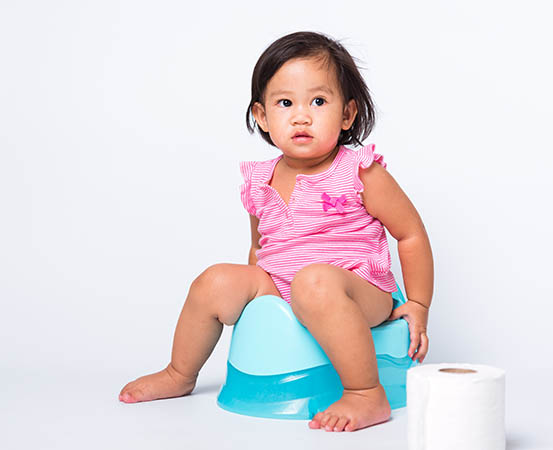
On a recent family trip to a temple in north Karnataka, Sandeep Anand, a banker from Bengaluru, felt a sudden wetness on the front of his shirt. It was because his two-year-old son had urinated.
“The boy was not using a diaper that day,” says Sandeep. The incident made the family resolve to potty-train the toddler.
Toilet training is the process of teaching a child to use a potty or toilet.
According to Dr Mahammad Mahfuz Mallick, consultant pediatrician, Medica Hospital, Kolkata, without proper training a child will not get into the habit of peeing or pooping in the toilet and will be poor at recognising bowel movements and body signals. “They became dependent on diapers,” he says. “It causes embarrassment.”
Doctors also point out that diaper rashes are common among babies.
Why is potty training important?
“It can be difficult to teach a toddler,” says Dr Kamlesh P Haria, consultant pediatrician, SL Raheja Hospital, Mumbai. “A child might not respond appropriately at first, but establishing a pattern and sticking to it will help in developing the habit.” He adds that potty training eventually makes a child independent.
“Potty and toilet training are basic life skills, which include hygiene practices like hand washing and using the flush,” says Aarti Mehta, potty-training consultant at Snugbub, a Bengaluru-based parental support group.
Divya P, a 29-year-old Bengaluru-based teacher, recalls how she taught her two-year-old son Dhruv to use the toilet. She would ask him if he wanted to pee or poop. “With constant efforts and consistency, I was able to train my child within a week,” she says. “He now senses his bowel movements and gives me signals.”
When to start the training?
Toilet training should start when a child has developed motor skills and can sense bowel movements, says Dr Haria. “The child should be active enough and should have control over the body,” he says. “Not every child will be prepared at the same age.”
Mehta says potty-training accessories are available to help children. “For example, a seat reducer — to be used on a commode along with a step stool (for height adjustment) — will help a child in the initial days,” she says. “The time it takes to be potty-trained varies from child to child. It can be anywhere between two weeks and many months.”
About the right time to start toilet training, Dr Sahana Shankar, consultant pediatrician, Mazumdar Shaw Medical Centre, Bengaluru, says:
- The ideal time to start potty training is after the age of two.
- If a child can distinguish between a dry and a wet condition and exhibits facial changes when the nappy is wet, it is a clear sign of readiness for starting the training.
- When a child is able to sit properly.
- When a child understands bowel movements and senses the urge to urinate.
- When a child responds to a parent’s body language.
“If a child is unable to sit and experiences a fall, it may create a phobia or fear factor in the child,” says Dr Shankar. “This may lead to fear of pooping and the child may tighten the muscles, which prevents the poop from coming out.”
How to deal with potty-training challenges
Mehta says rather than consider potty training a burden, parents should train the child with love. She recalls a case where a Bengaluru-based couple were struggling to potty-train their three-year-old son. The child used to wear a diaper and would refuse to use the bathroom. Later, his mother consulted Mehta.
Since things were not working out, the doctor told her to stop trying to train the child for two weeks, and then begin again. The advice worked and the boy was soon potty-trained.
“Parents must identify the root of a child’s resistance to take appropriate action,” says Mehta. “I would suggest parents read some potty-training-related books.”
Dr Haria says parents should consult a doctor if their child has not been toilet-trained by the age of three or four. “In such a case, it could be due to a behavioural issue,” he said.
Takeaways
Potty training can be taught only when a child is able to sit. Starting too early or, say, a fall in the washroom may lead to a child becoming scared. Practice and consistency are important while training a toddler. Accessories such as a seat reducer help.

















